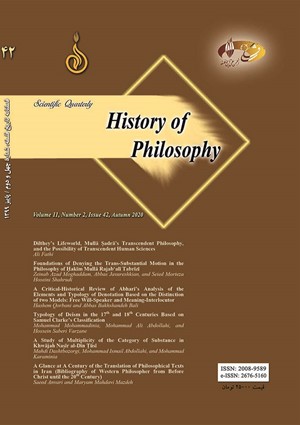A Critical-Historical Review of Abharī’s Analysis of the Elements and Typology of Denotation Based on the Distinction of two Models: Free Will-Speaker and Meaning-Interlocutor
Subject Areas : تعامل اندیشهها، اثرگذاری اندیشههای فلیسوفان بر جامعه و تفکر پس از خود
Hashem Ghorbani
1
*
,
Abbas Bakhshandeh Bali
2
![]()
1 - Assistant Professor, Islamic Teachings Department, Imam Khomeini International University, Qazvin, Iran
2 - Assistant Professor, Islamic Teachings Department, University of Mazandaran, Babolsar, Iran
Keywords: Denotation meaning free will speaker interlocutor Abharī ,
Abstract :
The present study provides a critical-historical review of semiotics in Abharī’s view and aims to explain his encounter with the problems of the realm of semantics and his standpoints in this regard. Here, the authors have tried to evaluate and analyze some descriptions of denotation and its typology. Accordingly, relying on Abharī’s conception of the nature of denotation, his analysis of its typology, and an evaluation of his view as to the inefficiency of denotation of implication, the authors provide a critical account of this philosopher’s view while employing certain elements, such as the speaker’s will in transferring meaning, the role of interlocutor’s understanding in the correct construction of meaning, and thought structure. Logicians believe that denotation depends on context and have considered contextual awareness as a necessary condition. The authors have also explained that, in addition to this criterion, some other elements in the realm of meaning, the speaker, and the interlocutor affect the creation of denotation. Through moving the concept of denotation beyond the domain of single words and its vast application to sentences and, particularly, propositions and also following a non-quiddative approach in dealing with the specification of the concepts of the field of denotation, Abharī connects semiotics with semantic discussions. Here, Abharī’s views regarding semiotics have been presented in comparison to other thinkers. Some of his endeavors in this realm include redefining denotation based on the meaning-interlocutor model, providing two different interpretations of the place of context in the typology of denotation, criticizing Fakhr al-Dīn’s analysis of similar denotations and their distinction from the other two types of denotation through adopting a dependent or independent subject and considering evaluation-centeredness, criticizing the analysis of Khunaji and Kashi of the metaphorical nature of inclusion and implication denotation, criticizing Suhrawardī’s and Rāzī’s description of implicative-corresponding relations, and criticizing the inefficient approaches to implication denotation, and designing an image based on misunderstanding based on the plurality of mental transfers.
ابنسینا (1384) اشارات و تنبیهات، تحقیق کریم فیضی، قم: مطبوعات دینی.
ابنسینا (1404ق) منطق شفا، تصحیح سعید زائد، قم: كتابخانة آيتالله مرعشی.
ابنسینا (1405ق) منطق المشرقیین، قم: كتابخانة آيتالله مرعشی.
ابهری، اثیرالدین (1395) منطق منتهی الافکار، تحصیح مهدی عظیمی و هاشم قربانی، تهران: حکمت.
ابنسینا (1396الف) خلاصة الافکار، تصحیح مهدی عظیمی و هاشم قربانی، تهران: مؤسسه پژوهشی حکمت و فلسفه ایران.
ابنسینا (1396ب) «منطق بیان¬ الاسرار»، تصحیح مهدی عظیمی، مجله فلسفه و کلام اسلامی، سال پنجاهم، شمارة دوم، ص299ـ269.
ابنسینا (بی¬تا¬الف) کشف الحقائق، نسخة خطی مجلس شورای اسلامی به شماره 2752.
ابنسینا (بی¬تا¬ب) دقائق الافکار، نسخة خطی مجلس شورای اسلامی به شماره 2752.
ابنسینا (بی¬تا¬ ج) عنوان الحق، نسخة خطی مجلس شورای اسلامی به شماره 2752.
ارموی (بی¬تا) شرح مطالع الانوار، قم: انتشارات كتبي نجفي.
امیرخانی، مهناز (1388) «چیستی و اعتبار دلالت التزامی» حکمت سینوی، سال 13، شمارة 42.
تفتازانی، مسعود (1374ق) المطول، تهران: مکتبة العلمية الاسلامية.
خونجی، افضل¬الدین (1389) کشف الاسرار، تصحیح خالد الرویهب، تهران: مؤسسه پژوهشی حکمت و فلسفه ایران.
خونجی، افضل¬الدین (بی¬تا) مختصر فی علم المنطق، نسخة خطی، کتابخانه مجلس شورای اسلامی، شمارة 1984.
رازی، فخرالدین (1381) منطق الملخص، تصحیح احد فرامرز قراملکی و آدینه اصغرینژاد، تهران: دانشگاه امام صادق(ع).
رازی، فخرالدین (1384) شرح الاشارت و التنبیهات، تحقيق كريم فيضي، قم: مطبوعات ديني (ضميمه اشارات ابنسينا).
رازی، قطبالدین (1391) «رسالة فی الدلالات»، تصحیح هاشم قربانی و سیدمصطفی موسوی اعظم، در یادنامه استاد عبدلله نورانی، تهران: خانة کتاب.
رازی، قطبالدین (بی¬تا) شرح مطالع الانوار، قم: انتشارات کتبی نجفی.
رشیدهزاده، حسین؛ قراملکی، احد فرامرز؛ مفتونی، نادیا (1392) «دامنه مهجوریت دلالت التزام نزد منطقدانان مسلمان»، خردنامه صدرا، سال 19، شمارة 74، ص114ـ97.
سهروردی، شهابالدين يحيي (1380) حکمة الاشراق، تصحیح هانری کربن، تهران: پژوهشگاه علوم انسانی و مطالعات فرهنگی.
سهروردی، شهابالدين يحيي (1385) المشارع و المطارحات، تصحیح مقصود محمدی و اشرف عالیپور، تهران: حق یاوران.
شیرازی، قطب¬الدین (1383) شرح حکمة الاشراق، به اهتمام عبدالله نورانی و مهدی محقق، تهران: انجمن آثار و مفاخر فرهنگی.
شیرازی، قطب¬الدین (1384) المحاكمات، تحقيق كريم فيضي، قم: مطبوعات ديني (ضميمه اشارات ابنسينا).
طوسي، خواجهنصير (1384) شرح اشارات و تنبيهات، قم: مطبوعات ديني.
عبادی، احمد (1396) «دلالت سمانتیکی و دلالت تصوری»، مجله فلسفه و کلام اسلامی، سال 50، شمارة 2، ص245ـ268.
عزیزی¬کیا، غلامعلی (1387) «دلالت التزامی و نقش آن در فهم و تفسیر متن»، مجله قرآنشناخت، سال اول، شمارة 1، ص82ـ105.
عظیمی، مهدی (1396) «مقدمة» در ابهری، خلاصة الافکار، تهران: مؤسسه پژوهشي حكمت و فلسفه ايران
ملاصدرا (بی¬تا) تعلیقات بر حکمه الاشراق، قم: بیدار.
واعظی، احمد (1389)، درآمدی بر هرمنوتیک، تهران: پژوهشگاه فرهنگ و اندیشه اسلامی.
وفائیان، محمدحسین؛ برخورداری، زينب (1394) «معیارهای تمایز دلالت تضمنی و التزامی از مجاز در لفظ»، مجله فلسفه و کلام اسلامی، سال 46، شمارة 1، ص121ـ135.

